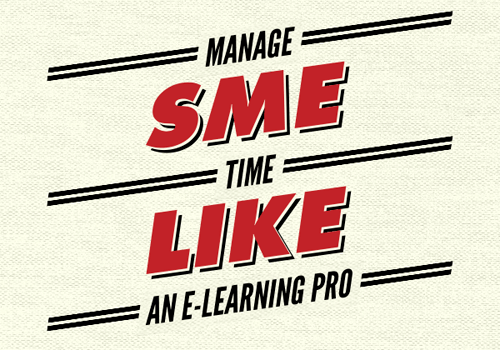R-E-S-P-E-C-T… Respect Your Subject Matter Expert and Gain a Valuable Partner in E-Learning Design and Development
News flash: There are no shortcuts to take or magic wands to wave when it comes to creating an e-learning course from scratch. Ample time and hard work go into crafting every word and every pixel for maximum effectiveness and engagement for our learners. It can be a demanding – and highly rewarding – job for all team members, both vendors and clients.
A key player on the team is the Subject Matter Expert (SME). SMEs are in a special category, because they bring the special sauce that no one else can – as the name states, subject matter expertise! In our trade, contextual expertise is the basis for the information and skills learners need to improve their performance. Content and insight provided by SMEs, in the hands of talented instructional designers (IDs) are transformed into scenarios that provide real-world context, and activities that challenge learners to apply and demonstrate what they’ve learned.
SMEs are special members of the team for another reason – they often come with little experience in instructional design or the e-learning design and development process. Nor should they – after all, they have full-time (plus) jobs within their practice! Carving out time to participate in e-learning development can be challenging for SMEs, yet their input and expertise is essential for designing effective e-learning.
So, what’s in it for SMEs? Many SMEs enjoy the opportunity to engage in the creative process with IDs, and take pride in the e-learning course that is the end result. They are validated as experts, and their efforts help their organization and their fellow workers become more successful.
Once your SME is onboard with the project, helping the SME manage their time is critical to success of any e-learning initiative.
How To Manage SME Time Like a Pro
Top-notch e-learning vendors, and in particular their project managers (PMs) and IDs, know the best ways to manage SME time. I’ll let you in on a few secrets from our experience:
- Recognize that your SMEs have demanding day jobs. Treat their time with the utmost respect, and never waste it by asking them to review unfinished deliverables. Always be prepared for interviews having read any provided materials and have your questions at the ready.
- Set expectations early in the process. Provide an overview of the steps or stages from start to finish, where they should plan to be involved, and how much time they should expect to spend in each stage.
- Ask for travel and vacation schedules that may impact your SMEs availability. You can bake these into the project plan and adjust delivery dates accordingly.
- Provide an orientation to all deliverables, and walk-through the primary areas of a deliverable to help SMEs streamline their time and focus on areas relevant to them.
- Find out how your SMEs like to work right from the get-go, and the easiest way to reach out if you have a quick question – shooting them email, jumping on the phone, or even sending an IM or text.
Setting Expectations: How Much Time Do SMEs Need?
In Part Two of this series, we’ll get into the nuts and bolts of the process and specific hours for an e-learning course. But first, let’s talk about some of the variables that affect SME time.
- Complexity of the e-learning course: A simple knowledge-based course will take much less time than a complex scenario-driven course or simulation. For our higher level courses, we often have one or two day face-to-face working sessions to nail down a complex scenario and expert responses.
- Content availability: How much of the content is documented? How much of that content is stable (not changing)? The more content that is undocumented or in flux, the more SME hours you can expect.
- Size of the SME team: What’s that saying about cooks in the kitchen? Sometimes you do need a larger SME team, if each SME needs to provide and approve different parts of the content. But a larger team also means more opinions and more time to resolve them.
- Special factors for software system courses: System training e-learning courses offer their own special complexities. Incomplete interface development and malfunctioning operations can impact SME time, delaying or requiring rework.
- Delays, interruptions, and reassignments: These are often impossible to predict at the beginning of a project, but suffice it to say that frequent stops and starts will increase time overall. Every time a project is put on hold efficiency is lost and time has to be re-invested to restart the project.
- External review for credentialing or other approvals: Some courses require external reviews for credentialing purposes; these usually result in added review cycles for SMEs.
What are some other e-learning pro tips that you have for working with SMEs? I would love to hear your thoughts – leave a comment!
Stay tuned for Part Two of this series, Managing SME Time Like an E-Learning Pro, where I will break down the typical SME time on an e-learning course, along with lots of best practice tips.
What does it take to successfully manage large-scale e-learning design and development? Check out our interactive infographic, Key Aspects of Program Management to learn our best practices and tips!







